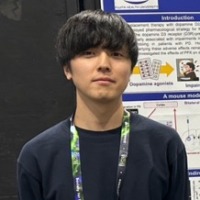Division of Behavioral Neuropharmacology
Projects
Behavioral pharmacology is a field of science that analyzes higher-order functions of the brain by observing behavioral changes in individuals. Based on this experimental approach, we are analyzing the mechanism of emotions (pleasant or unpleasant) and cognition (learning and memory) at multiple levels, from molecules to cells, circuits, and individuals. We also investigate the pathophysiological mechanism of psychiatric disorders, including schizophrenia, drug addiction, and bipolar disorder. As a member of ICBS, we widely collaborate with basic and clinical researchers inside and outside the university to produce high-impact research results that can be disseminated worldwide.
Members
-

-
Taku Nagai, Professor
My research field is behavioral neuropharmacology and neurochemistry. I am investigating the mechanisms of emotional/cognitive function and trying to develop new treatments/drugs for mental illness.
-

-
Akira Sobue Senior Assistant Professor
I have been conducting research on the involvement of neuroinflammation in neuropsychiatric/neurodegenerative diseases. Currently, my research aims to identify therapeutic targets and to develop novel treatments and preventive strategies for neurological diseases.
-

-
Xinjian Zhang, Assistant Professor
Originally from Jiangsu Province, China, it has been more than 10 years since I came to Japan. During this time, I was engaged in the analysis of phosphorylation signals in negative emotions at Nagoya University (Prof. Kaibuchi’s Laboratory). Currently, I am studying the molecular mechanism of reward learning.
-

-
Hisayoshi Kubota, Assistant Professor
I was studying the influences of lifestyle habit on the emotional/cognitive function. Currently, I am trying to identify the neural circuits involved in behavioral addictions and to elucidate the pathological mechanisms of psychiatric disorders focusing on risk genes.
-

-
Takanori Matsubara, Assistant Professor
I previously focused on uncovering the mechanisms behind delayed-onset muscle soreness and developing X-ray-based optogenetic techniques. Building on my experience in Dr. Grégory Scherrer’s lab at UNC-CH, I am now researching opioid-based drug dependence, along with the mechanisms of pain induction and analgesia within the central nervous system.
Main publications
- Lin Y-H, Yamahashi Y, Kuroda K, Faruk MO, Zhang X, Yamada K, Yamanaka A, Nagai T#, Kaibuchi K. Accumbal D2R-medium spiny neurons regulate aversive behaviors through PKA-Rap1 pathway. Neurocham. Int. 143, 104935, 2021. (#corresponding author).
- Wulaer B, Nagai T*#, Sobue A, Itoh N, Kuroda K, Kaibuchi K, Nabeshima T, Yamada K. Repetitive and compulsive-like behaviors lead to cognitive dysfunction in Disc1Δ2-3/Δ2-3 mice. Gene Brain Behav. e12478, 2018. (*co-first author, #corresponding author).
- Nagai T, Nakamuta S, Kuroda K, Nakauchi S, Nishioka T, Takano T, Zhang X, Tsuboi D, Funahashi Y, Nakano T, Yoshimoto J, Kobayashi K, Uchigashima M, Watanabe M, Miura M, Nishi A, Kobayashi K, Yamada K, Amano M, Kaibuchi K. Phosphoproteomics of the dopamine pathway enables discovery of Rap1 activation as a reward signal in vivo. Neuron 89, 550–565, 2016.
- Nagai T, Ito M, Nakamichi N, Mizoguchi H, Kamei H, Fukakusa A, Nabeshima T, Takuma K, Yamada K. The rewards of nicotine: regulation by tissue plasminogen activator-plasmin system through protease activated receptor-1. J. Neurosci. 26, 12374-12383, 2006.
- Nagai T, Yamada K, Yoshimura M, Ishikawa K, Miyamoto Y, Hashimoto K, Noda Y, Nitta A, Nabeshima T. Tissue plasminogen activator-plasmin system participates in the rewarding effect of morphine by regulating dopamine release. Proc. Natl. Acad. Sci. USA 101, 3650-3655, 2004.
Information
Division of Behavioral Neuropharmacology
【Address】
#603, 1st building, Fujita Health University, 1-98 Dengakugakubo, Kutsukake-cho, Toyoake, Aichi 470-1192, Japan
【Contact】
E-mail: taku.nagai(at)fujita-hu.ac.jp /Tel:+81-562-93-9957
※ Please replace “(at)” with “@”.
